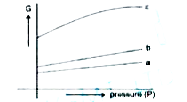Statement -I : There is no change in enthalpy of an ideal gas during compression at constant temperature.
Statement-II: Enthalpy of an ideal gas is a function of temperature and pressure.Solution in Telugu
Statement-I is true, statement-II is true and statement-II is correct explanation for statement-I
Statement-I is true, statement-II is true and statement-II is NOT correct explanation for statement-I
Statement -I is false, statement-II is true.
Statement-I is true, statement-II is false
The correct Answer is:D
Step by step video, text & image solution for Statement -I : There is no change in enthalpy of an ideal gas during compression at constant temperature. Statement-II: Enthalpy of an ideal gas is a function of temperature and pressure. by Chemistry experts to help you in doubts & scoring excellent marks in Class 12 exams.
Updated on:21/07/2023Topper's Solved these Questions
- CHEMICAL THERMODYNAMICSBook:AAKASH SERIESChapter:CHEMICAL THERMODYNAMICSExercise:Practice Sheet- Exercise-II
Explore 30 Videos
- CHEMICAL THERMODYNAMICSBook:AAKASH SERIESChapter:CHEMICAL THERMODYNAMICSExercise:Practice Sheet- Exercise-III
Explore 30 Videos
- CHEMICAL THERMODYNAMICSBook:AAKASH SERIESChapter:CHEMICAL THERMODYNAMICSExercise:Lecture Sheet -Exercise-IV
Explore 16 Videos
- CHEMICAL KINETICSBook:AAKASH SERIESChapter:CHEMICAL KINETICSExercise:Objective Exercise - 4 (Assertion (A) & Reason (R) Type Questions)
Explore 44 Videos
- CHEMISTRY IN EVERY DAY LIFEBook:AAKASH SERIESChapter:CHEMISTRY IN EVERY DAY LIFEExercise:PRACTICE EXERCISE
Explore 29 Videos
Similar Questions
Assertion: Under adiabatic free expansion, (dUdV)T is +ve when attractive forces are dominant between gas molecules [U,V,T respresent internal energy, volume and temperature of gas respectively]
Reason: Internal energy is a state function.
View SolutionThe following curve represents the variation of Gibbs function 'G' with pressure at constant temperature. Correct match of given plots with the physical state of a substance is

View SolutionFor a reaction R1,ΔG=xKJmol−1. For a reaction R2,ΔG=yKJmol−1. Reaction R1 is non-spontaneous but along with R2 it is spontaneous. This means that
View Solution(A) Spontaneous reaction may be slow or fast.
(R ) Spontaneous nature deals with feasibility of the reaction but not rate.
View SolutionAnti allergy drugs are
View SolutionStatement: In the case of an ideal gas the changes in Gibbs and Helmholtz free energies are equal to each other ( DeltaG=DeltaA ) for isothermal reversible process. Explanation: There is no change in internal energies and enthalpies for ideal gas at constant temperature.
View SolutionThere is no change in internal energy for an ideal gas at constant temperature.
Internal energy of an ideal gas is a function of temperature only.
View SolutionStatement-1: A real gas behaves as an ideal gas at high temperature and low pressure .
Statement-2: Liquid state of an ideal gas is impossible.
View SolutionThese question consists of two statements each, printed as Statement-I and Statement-II . While answering
these Question you are required to choose any one of the following four responses.
Statement-I : There is no change in enthalpy of an ideal gas during compression at constant temperature .
Statement -II : Enthalpy of an ideal gas is a function of temperature and pressure.
View SolutionAn ideal gas at constant temperature and pressure expands, then its
View SolutionStatement-1.During isothermal expansion of an ideal gas, there is no change in the internal energy. Statement -2.During isothermal expansion of an ideal gas , as temperature remains constant, no heat enters or leaves the system.
View SolutionIf the pressure of an ideal gas at constant volume is decreased by 20% then the percentage change in temperature will be
View SolutionStatement-1 : There is no change in enthalpy of an ideal gas during compression at constant temperautre. Statement-II : Enthalpy of an ideal gas is a function of temperature and pressure.
View SolutionStatement-1 : There is no change in enthalpy of an ideal gas during compression at constant pressure.
Statement-II : Enthalpy of an ideal gas is a function of temperature .
View SolutionStatement I : Internal energy of an ideal gas does not depends on volume of the gas. Statement II : This is because internal energy of an ideal gas depends on temperature of the gas.
View Solution

